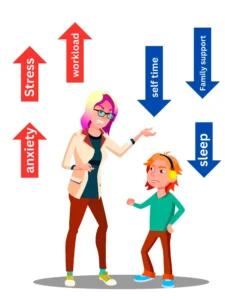Last updated on November 11, 2024
Have you ever felt completely worn out from motherhood’s responsibilities, both physically and emotionally? If you have, you may likely have experienced “Depleted Mother Syndrome” (DMS).
It seems like we are continuously riding an emotional rollercoaster, therefore I am aware that it’s not a simple job. One day you’ll be in a wonderful mood, and the next you’ll be depressed. The struggle to achieve harmony between the body and the emotions is ongoing.
A 2018 study published in Frontiers in Psychology found that approximately 12.9% of parents experience high levels of burnout. That’s almost one out of every nine parents out there! But the good news is that there are proven ways you can reclaim your energy levels so that you can feel your old self again. In this blog post, we’ll cover everything from what DMS is all about to how to overcome its symptoms and get back on track with your life and energy levels!
In-Depth Analysis
- What is Depleted Mother Syndrome?
- Symptoms and Effects of Depleted Mother Syndrome
- Causes of Depleted Mother Syndrome (DMS)
- Diagnosis and Treatment of Depleted Mother Syndrome
- Breaking the Cycle: Preventing Depleted Mother Syndrome
- Conclusion
What is Depleted Mother Syndrome?

Alright, let’s break it down.
Depleted Mom Syndrome (DMS) is like feeling completely drained, both physically and emotionally, as a result of the never-ending demands of being a mother. It’s that overwhelming feeling of running on empty like your energy tank has hit rock bottom.
Parenting is tough and comes with its own set of challenges. You know those days when you can barely keep your eyes open, but you still have a million things to do? That’s DMS in action. It’s when you’re pushing through, trying to be a supermom, but deep down, you’re running on fumes.
This syndrome can sneak up on you and eventually wear you out. Stress, lack of sleep, and the burden of all those increasing obligations are all contributing factors. You give and give, devoting your everything to care for others but neglecting to restock your cup.
The worst part is that DMS does not discriminate. It can affect any mum out there, whether she works, stays at home, or expertly balances the two.
My friend, the hardship is genuine.
Symptoms and Effects of Depleted Mother Syndrome
Mothers who are losing the capacity to care for their kids as a result of ongoing stress and weariness are known as having depleted mother syndrome. Symptoms of depleted mother syndrome can sometimes be confused with other mental and physical issues. However, you should reflect upon it if you or your loved ones are having these issues.
Feelings of anxiety, depression, and isolation
Mothers experiencing DMS may frequently experience overwhelming feelings of anxiety and sadness. These emotions can lead to a grave situation and a sense of isolation, as they may struggle to connect with others or seek support from their social network.
Crying spells or mood swings
DMS can manifest as sudden episodes of uncontrollable crying or noticeable mood swings. Mothers may find themselves feeling emotionally vulnerable and easily overwhelmed, with their moods fluctuating from sadness to irritability without apparent cause.
Extreme fatigue
A prevalent symptom of mom burnout is an overwhelming sense of fatigue or exhaustion, both physically and mentally. Mothers may find it challenging to muster the energy or feel constantly drained, even after adequate rest or sleep. For instance, a mother may find herself struggling to get out of bed in the morning, despite having slept for eight hours, or feeling completely drained after simple tasks like preparing breakfast or helping with homework, making even the smallest daily activities feel insurmountable.
Insomnia or trouble sleeping
DMS can disrupt a mother’s sleep patterns, leading to difficulties falling asleep or staying asleep throughout the night. Insomnia may be accompanied by racing thoughts, worries, or an inability to relax, further exacerbating the fatigue experienced during the day.
Loss of appetite or overeating
Mothers with DMS may experience changes in their eating habits. Some may lose their appetite, finding it difficult to consume regular meals. Conversely, others may engage in emotional eating, using food as a coping mechanism to soothe their emotional distress.
An inability to concentrate or focus on tasks at hand
DMS can impair a mother’s ability to concentrate or stay focused on daily tasks or responsibilities. The mind may feel scattered or overwhelmed, making it challenging to complete tasks efficiently and leading to increased frustration or self-criticism.
Problems with memory and attention span
Mothers experiencing DMS may notice difficulties with memory and attention. They may struggle to remember details, appointments, or important information, which can further contribute to feelings of stress and inadequacy.
Causes of Depleted Mother Syndrome (DMS)

There are many reasons for a mother to develop depleted mother syndrome. Some of the most common causes include:
Stress and Exhaustion
The leading cause of Depleted Mom Syndrome is the overwhelming burden of stress and exhaustion. Whether originating from physical, mental, or emotional sources, these factors take a toll on the body, mind, and emotions.
Physical Effects
The body’s response to stress and exhaustion involves self-preservation mechanisms. As a result, bodily functions may slow down. The immune system weakens, digestion becomes sluggish, and energy levels plummet. Manifestations like insomnia, headaches, and persistent fatigue become common.
Emotional Disturbances
When grappling with mom burnout, emotions can become dysregulated. Irritability might arise more frequently than usual, and forgetfulness about appointments or essential personal belongings (such as keys or wallets) can become more commonplace.
Depletion
The most prevalent cause of mom burnout is depletion itself. Inadequate sleep and excessive stress, leading to burnout, contribute to this condition. It predominantly affects working mothers who juggle career and childcare responsibilities.
Trauma
If a mother experiences childhood abuse or neglect, the lingering effects of trauma can significantly impact her mental health as an adult. Insufficient support from family and friends amplifies the risk of Depleted Mom Syndrome in such cases.
Lack of Support
Insufficient financial resources or emotional support can exacerbate maternal exhaustion. Struggling with depression or not having someone available to assist in caring for children amplifies stress levels, adding to the overall burden a mother faces.
Postpartum Depression
Approximately 10% of new mothers experience postpartum depression (PPD). Symptoms may include persistent feelings of sadness or distress, difficulties in bonding with the baby, a sense of hopelessness, thoughts of self-harm or harm to the baby, and challenges in concentration and decision-making. Seeking timely assistance from a healthcare professional is crucial for exploring treatment options.

Diagnosis and Treatment of Depleted Mother Syndrome
So, do you suspect you might be dealing with Depleted Mom Syndrome (DMS) or mom burnout?
It’s essential to seek a proper diagnosis and explore treatment options to support your well-being. Here’s what you can do:
1. Diagnosis
First things first, consult a healthcare professional, such as a doctor or therapist. Share your experiences, symptoms, and concerns openly. They can evaluate your situation and determine if parental fatigue is indeed the culprit behind your struggles.
2. Therapy
Therapy can be incredibly beneficial in addressing DMS. Individual therapy allows you to explore your emotions, experiences, and underlying factors contributing to your burnout state. A skilled therapist can provide guidance, support, and coping strategies tailored to your needs.
3. Medication
In some cases, medication may be recommended. Antidepressants or anti-anxiety medications can help manage symptoms associated with mothers’ burnout. A healthcare professional will assess your situation and determine if medication is appropriate for you.
4. Self-Care
Prioritize self-care like never before! Engage in activities that rejuvenate you, like relaxing baths or walks in nature. Indulge in a hobby that brings you joy, like painting or sewing. Spending time with loved ones and friends who support your well-being this would help you with mom burnout.
5. Getting Enough Sleep
You’re doing a great job. You deserve to take some time for yourself, and you should. Make sure you sleep enough because it’s important to your health. Don’t think of it as selfish—it’s necessary.
6. Delegating tasks
Don’t be afraid to ask for help with things that are too much for you to handle on your own. Delegating tasks can lighten the load and alleviate some of the stress and exhaustion you may face with parental fatigue.
7. Focusing on your mental, physical, and emotional wellbeing
Take care of yourself physically, mentally, and emotionally by eating healthy meals, staying active, enjoying hobbies and other activities you enjoy, getting enough rest/sleep, spending time with loved ones who understand what you’re going through—and spending time alone doing nothing at all (maybe with a good book).
8. Be patient with yourself:
Recovery takes time, but over time it will get easier!
Celebrate small victories along the way and acknowledge that self-care and healing are ongoing journeys—there is no one-size-fits-all solution when it comes to healing from trauma or abuse; every person has their unique path towards healing and hope.
Video Credits: TEDxWilmingtonWomen
Breaking the Cycle: Preventing Depleted Mother Syndrome

To break the cycle of DMS, you can take steps to ensure that your parenting style is not contributing to it. “The role of family can influence the development of alleviation of challenges associated with depleted mother syndrome.” Says, Dr. Priyanka Pathak, a leading psychologist from India.
Some ways to do this include:
- Encouraging positive parenting practices such as warmth and responsiveness toward children. This can be done through positive reinforcement of appropriate behavior, or by giving praise when necessary.
Uncover eye-opening insights about common parenting mistakes you may be making for you and your children in this revealing article.
- The role of education and awareness in preventing depleted mother syndrome should not be overlooked. We must all do our part in educating ourselves about mental health issues like depression so we can better identify symptoms and seek help if needed!
- Promoting mental health support for mothers is another important step toward breaking this cycle–and one that many people don’t think about until it’s too late…or worse yet never even consider at all!
Wrapping Up
I hope you’ve learned a little about Depleted Mother Syndrome. It’s a real condition that affects many people, but it can be treated with therapy and medication. If you think that you have this condition or know someone who does, please don’t hesitate to reach out for help!
Written by: Maryam
BA Early Childhood Education with Psychology










2 Comments